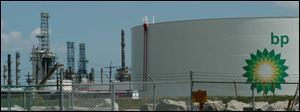
BP refinery to get 'safety culture' checkup
8/29/2005
The BP refinery in Oregon has a solid safety record in recent years, a federal official said.
BP Inc.'s refinery in Oregon soon will undergo one of the more obscure, nebulous methods of assessing risk in the modern workplace: one that seeks to grasp a corporation's institutional "safety culture."
Sound familiar?
Few government regulators can define or measure it, but like some things in life, they claim to know what it is when they see it - or don't see it.
Safety culture is a term that grew out of assessments that arose after the world's worst nuclear accident, the 1986 Chernobyl power plant disaster in Ukraine. Such assessments were used to assess NASA's competence after the 1986 Challenger explosion and the 2003 Columbia shuttle disaster.
Safety culture rose to prominence in northern Ohio in January, 2003. At that time, the
Nuclear Regulatory Commission attributed many of the problems leading to the near-rupture of the Davis-Besse nuclear plant's steel reactor lid to a common theme: a lack of safety culture.
FirstEnergy Corp. took steps to regain the regulator's confidence, from revamping its training procedures to reorganizing management. The utility did multiple employee surveys and one-on-one interviews, opened the plant up to NRC inspectors, and even hired an internationally recognized industrial psychologist to document improvements.
Such broad assessments of a company's workplace atmosphere aren't done that often. They're reserved largely for sites that have experienced major accidents or close calls.
The BP refinery in Oregon, generally seen as having a commendable safety record, doesn't fit into that category. But on Aug. 17, the U.S. Chemical Safety and Hazard Investigation Board ordered BP to empanel an independent board to assess the safety culture at each of its five North American refineries, including the one in Oregon.
The studies are in response to problems at another BP refinery - one in Texas City, Texas, where one of the most serious workplace disasters in the past 20 years occurred March 23.
Fifteen people were killed and 170 others injured in a chemical accident that occurred months after two fatal accidents in 2004. Then, on July 28 and Aug. 10, two other incidents at that refinery - one of which involved a hydrogen fire - required alert notifications to the public.
BP has told regulators it is doing all within its power to ensure safety at each facility. But the federal board, for the first time in its eight-year history, called for the immediate formation of an independent panel to assess safety culture without waiting until all investigations are done.
The action was classified as an "urgent recommendation." BP was ordered to pay for the studies, but have them performed by outside experts. The special panel, which is being formed, has up to a year to report its findings to the U.S. Chemical Safety and Hazard Investigation Board.
Dick Tracy, assistant area director for the U.S. Occupational Safety and Health Administration in Toledo, said BP's Oregon refinery has been a solid performer with no serious issues raised in recent years.
Records show OSHA investigators have not been sent to the refinery since 1997, and no violations resulted from that inspection.
Two violations were issued in 1993 for insufficient guardrails.
Few incidents have been reported at the BP refinery in Oregon since a spectacular fire Oct. 12, 1996, that caused more than $1 million damage and resulted in an evacuation of some nearby residents. The fire also idled the plant for more than a week. But nobody was hurt.
"The record speaks for itself," Mr. Tracy said. "There hasn't been anything [serious]."
BP also has refineries in Carson, Calif., Whiting, Ind., and Cherry Point, Wash.
Spokesman Ronnie Chappell said BP has a "deep and very strong commitment to safety" at each of its facilities. He said the special panel will devise its own method for assessing the safety culture at each site. "I won't speculate how they'll go about their work," he said.
John Browne, BP Group chief executive, issued a statement following the chemical safety board's decision indicating that BP "will do everything possible to ensure nothing like [the Texas City explosion] happens again."
He said BP will respond promptly to the recommendations that are delivered by the special panel studying BP's safety culture.
Ross Pillari, president of BP Products North America, Inc., echoed Mr. Browne's statement. Mr. Pillari said BP looks forward to working with the U.S. Chemical Safety and Hazard Investigation Board, as well as the special panel, to achieve "our common goal of making our refineries as safe as they can be."
Contact Tom Henry at: thenry@theblade.com or 419-724-6079.